| Portugal in the Eurovision Song Contest | |
|---|---|

| |
| Participating broadcaster | Rádio e Televisão de Portugal (RTP; 2004–present)
Formerly
|
| Participation summary | |
| Appearances | 55 (46 finals) |
| First appearance | 1964 |
| Highest placement | 1st: 2017 |
| Host | 2018 |
| Participation history | |
| Related articles | |
| Festival da Canção | |
| External links | |
| Portugal's page at Eurovision.tv | |
Portugal in the Eurovision Song Contest 2024 | |
Portugal has participated in the Eurovision Song Contest 55 times since its debut at the 1964 contest. Since then it has missed five contests (1970, 2000, 2002, 2013, and 2016). The current Portuguese participant broadcaster in the contest is Rádio e Televisão de Portugal (RTP), which select its entrant with the national selection Festival da Canção. Portugal won the contest for the first time in 2017 and hosted the 2018 contest in Lisbon.
Portugal finished last on its debut in 1964 and again in 1974, before achieving its best result of the 20th century in 1996, with "O meu coração não tem cor" performed by Lúcia Moniz finishing sixth. The country then finished last for the third time in 1997. Having not appeared in the final since 2010 and as holders of the record for most appearances in the contest without a win, Portugal won at the 49th attempt, when "Amar pelos dois" by Salvador Sobral won the 2017 contest, Portugal's first top-five result in the contest. As hosts in 2018, the country finished last in the contest for a fourth time.
History

Radiotelevisão Portuguesa was a full member of the European Broadcasting Union (EBU), thus eligible to participate in the Eurovision Song Contest. It participated in the contest representing Portugal since its ninth edition in 1964. Since 2004, after a restructuring that led to the incorporation of Radiotelevisão Portuguesa into the current Rádio e Televisão de Portugal (RTP), it is the latter who participates representing Portugal.
Portugal's debut entry was "Oração" by António Calvário. It was not a successful debut for the country, with Calvário coming last in the contest. Since then, Portugal has come last on three further occasions, in 1974 with "E depois do adeus" by Paulo de Carvalho, in 1997 with "Antes do adeus" by Célia Lawson, and in 2018 as a host country. Despite its last-place finish in the contest, "E depois do adeus" gained notability for being used as the radio musical signal to begin the Carnation Revolution against the Estado Novo regime, being played at 22:55 on 24 April 1974. Prior to its sixth-place finish for "O meu coração não tem cor" by Lúcia Moniz in 1996, Portugal's best result in the contest was two seventh-place finishes, for Carlos Mendes in 1972 and José Cid in 1980. Despite prior poor results, the 1990s were the most successful decade for the country, with four recorded finishes in the top 10. Portugal was relegated in 2000 due to insufficient points accrued, and withdrew in 2002 due to financial difficulties (allowing Latvia, who ultimately won, to compete).
Since semi-finals were introduced in 2004, Portugal has failed to reach the final eight times, including from 2004 to 2007. In 2008, "Senhora do mar" by Vânia Fernandes finished 13th, Portugal's best result since 1996. The country continued to be present in the final until 2010. In 2017, Portugal reached the finals with "Amar pelos dois" by Salvador Sobral, ending a 6-year non-appearance in the finals, as it did not participate in the contest in 2013 and 2016 and did not qualify for the finals in 2011, 2012, 2014 and 2015, finally winning the contest for the first time ever, earning 758 points, setting the record for the highest number of points in the history of the competition, topping both the televoting and jury voting for the first time since Austria's "Rise Like a Phoenix" in 2014. It was the first winning song entirely performed in a country's native language since Serbia's "Molitva" in 2007. As the host country in 2018, Portugal came last for the fourth time in the contest, and for the first time in a non-joint last position. This was the third instance of a host country placing in the bottom five since 2015. Following a non-qualification in 2019, Portugal recorded a 12th-place finish in 2021, a ninth-place finish in 2022, a 23rd-place finish in 2023, and a tenth-place finish in 2024.
Absences
Portugal has been absent from five contests since their first participation. The country's first absence was in 1970, where Portugal, along with four other countries, boycotted the contest due to the result of the previous year, when four countries were announced the winner.
Portugal missed the 2000 contest due to their poor average results over the past five years. Despite being eligible to enter the 2002 contest, RTP declined to enter, and was replaced by eventual winner Latvia.
The fourth absence was in 2013, when Portugal didn't participate for financial reasons. The fifth absence was in 2016. RTP stated that this break was needed in order to facilitate a content renewal for its national selection for the Eurovision Song Contest, Festival da Canção.
Festival da Canção
Main article: Festival da CançãoFestival da Canção (sometimes referred to as "Festival RTP da Canção") is the Portuguese national selection for the Eurovision Song Contest, organized by RTP, and is normally held between February and March of the year of the contest. It is one of the longest-running Eurovision selection methods. Previously a number of regional juries selected the winner, however, the winner has been selected through televoting in recent years. In 2009, 2010 and since 2017, a 50/50 system between regional juries and televoting has been used.
In the years when Portugal does not participate in the contest, Festival da Canção was not held, except in two occasions: in 1970, when Portugal boycotted the contest, and in 2000, when the country was relegated.
Participation overview
| 1 | First place |
| 2 | Second place |
| ◁ | Last place |
| X | Entry selected but did not compete |
| † | Upcoming event |
Hostings
| Year | Location | Venue | Presenters | Image |
|---|---|---|---|---|
| 2018 | Lisbon | Altice Arena | Catarina Furtado, Daniela Ruah, Filomena Cautela and Sílvia Alberto | 
|
Awards
Marcel Bezençon Awards
Further information: Marcel Bezençon Awards| Year | Category | Song | Composer | Performer | Final | Points | Host city | Ref. |
|---|---|---|---|---|---|---|---|---|
| 2008 | Press Award | "Senhora do mar (negras águas)" | Andrej Babić, Carlos Coelho | Vânia Fernandes | 13 | 69 | ||
| 2017 | Artistic Award | "Amar pelos dois" | Luísa Sobral | Salvador Sobral | 1 | 758 | ||
| Composer Award |
Barbara Dex Award
Further information: Barbara Dex Award| Year | Performer | Host city | Ref. |
|---|---|---|---|
| 2006 | Nonstop | ||
| 2019 | Conan Osiris |
Related involvement
Conductors
| Year | Conductor | Notes | Ref. |
|---|---|---|---|
| 1964 | |||
| 1965 | Fernando de Carvalho | ||
| 1966 | Jorge Costa Pinto | ||
| 1967 | Armando Tavares Belo | ||
| 1968 | Joaquim Luis Gomes | ||
| 1969 | Ferrer Trindade | ||
| 1971 | Jorge Costa Pinto | ||
| 1972 | |||
| 1973 | Jorge Costa Pinto | ||
| 1974 | Jose Calvario | ||
| 1975 | Pedro Osorio | ||
| 1976 | |||
| 1977 | Jose Calvario | ||
| 1978 | |||
| 1979 | |||
| 1980 | Jorge Machado | ||
| 1981 | Shegundo Galarza | ||
| 1982 | Luis Duarte | ||
| 1983 | |||
| 1984 | Pedro Osorio | ||
| 1985 | Jose Calvario | ||
| 1986 | |||
| 1987 | Jaime Oliveira | ||
| 1988 | Jose Calvario | ||
| 1989 | Luis Duarte | ||
| 1990 | Carlos Alberto Moniz | ||
| 1991 | Fernando Correia Martins | ||
| 1992 | Carlos Alberto Moniz | ||
| 1993 | Armindo Neves | ||
| 1994 | |||
| 1995 | |||
| 1996 | Pedro Osorio | ||
| 1997 | |||
| 1998 |
Additionally, there was an orchestra present at the Portuguese national final in 1999 and 2001, where the winning entries were conducted by José Marinho and Rui Filipe Reis, respectively.
Commentators and spokespersons
| This section needs additional citations for verification. Please help improve this article by adding citations to reliable sources in this section. Unsourced material may be challenged and removed. (January 2020) (Learn how and when to remove this message) |
| Year | Television commentator | Radio commentator | Spokesperson | Ref. |
|---|---|---|---|---|
| 1963 | Federico Gallo | Unknown | Did not participate | |
| 1964 | Gomes Ferreira | Maria Manuela Furtado | ||
| 1965 | ||||
| 1966 | Fialho Gouveia | |||
| 1967 | ||||
| 1968 | ||||
| 1969 | Henrique Mendes | |||
| 1970 | Did not participate | |||
| 1971 | No spokesperson | |||
| 1972 | Amadeu Meireles | |||
| 1973 | Artur Agostinho | |||
| 1974 | Unknown | Henrique Mendes | ||
| 1975 | Júlio Isidro | Amadeu Meireles | Ana Zanatti | |
| 1976 | Unknown | |||
| 1977 | José Côrte-Real | |||
| 1978 | Eládio Clímaco | Isabel Wolmar | ||
| 1979 | Fialho Gouveia | Unknown | João Abel da Fonseca | |
| 1980 | Isabel Wolmar | Teresa Cruz | ||
| 1981 | Eládio Clímaco | Margarida Andrade | ||
| 1982 | Fialho Gouveia | |||
| 1983 | Eládio Clímaco | João Abel Fonseca | ||
| 1984 | Fialho Gouveia | Eládio Clímaco | ||
| 1985 | Eládio Clímaco | Maria Margarida Gaspar | ||
| 1986 | Fialho Gouveia | Fialho Gouveia | Margarida Andrade | |
| 1987 | Maria Margarida Gaspar | Unknown | Ana Zanatti | |
| 1988 | Margarida Andrade | Maria Margarida Gaspar | ||
| 1989 | Ana Zanatti | Margarida Andrade | ||
| 1990 | Ana do Carmo | João Abel Fonseca | ||
| 1991 | Maria Margarida Gaspar | |||
| 1992 | Eládio Clímaco | Ana Zanatti | ||
| 1993 | Isabel Bahia | Margarida Mercês de Mello | ||
| 1994 | Eládio Clímaco | Isabel Bahia | ||
| 1995 | Ana do Carmo | Serenella Andrade | ||
| 1996 | Maria Margarida Gaspar | Cristina Rocha | ||
| 1997 | Carlos Ribeiro | |||
| 1998 | Rui Unas | Lúcia Moniz | ||
| 1999 | João David Nunes | Manuel Luís Goucha | ||
| 2000 | Eládio Clímaco | Unknown | Did not participate | |
| 2001 | Margarida Mercês de Mello | |||
| 2002 | Did not participate | |||
| 2003 | Margarida Mercês de Mello | Helena Ramos | ||
| 2004 | Eládio Clímaco | Isabel Angelino | ||
| 2005 | ||||
| 2006 | Cristina Alves | |||
| 2007 | Isabel Angelino, Jorge Gabriel | Francisco Mendes | ||
| 2008 | Teresa Villa-Lobos | |||
| 2009 | Hélder Reis | No radio broadcast | Helena Coelho | |
| 2010 | Sérgio Mateus | Ana Galvão | ||
| 2011 | Sílvia Alberto | Joana Teles | ||
| 2012 | Pedro Granger | |||
| 2013 | Sílvia Alberto | Did not participate | ||
| 2014 | Joana Teles | |||
| 2015 | Hélder Reis, Ramon Galarza | Suzy | ||
| 2016 | Hélder Reis, Nuno Galopim (final) | Did not participate | ||
| 2017 | José Carlos Malato, Nuno Galopim | Filomena Cautela | ||
| 2018 | Hélder Reis, Nuno Galopim | Noémia Gonçalves, António Macedo, Tozé Brito | Pedro Fernandes | |
| 2019 | José Carlos Malato, Nuno Galopim | Unknown | Inês Lopes Gonçalves | |
| 2021 | Elisa Silva | |||
| 2022 | Nuno Galopim | Pedro Tatanka | ||
| 2023 | José Carlos Malato, Nuno Galopim | Maro | ||
| 2024 | No radio broadcast | Mimicat |
Photo gallery
-
 Simone de Oliveira in Naples (1965)
Simone de Oliveira in Naples (1965)
-
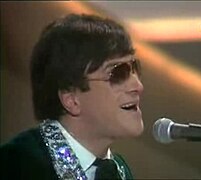 José Cid in The Hague (1980)
José Cid in The Hague (1980)
-
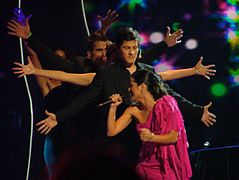 Sofia Vitória in Istanbul (2004)
Sofia Vitória in Istanbul (2004)
-
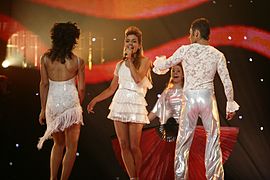 Sabrina in Helsinki (2007)
Sabrina in Helsinki (2007)
-
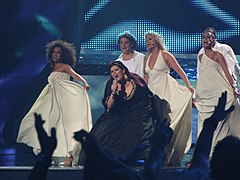 Vânia Fernandes in Belgrade (2008)
Vânia Fernandes in Belgrade (2008)
-
 Flor-de-Lis in Moscow (2009)
Flor-de-Lis in Moscow (2009)
-
Filipa Azevedo in Oslo (2010)
-
 Suzy in Copenhagen (2014)
Suzy in Copenhagen (2014)
-
 Leonor Andrade in Vienna (2015)
Leonor Andrade in Vienna (2015)
-
 Salvador Sobral in Kyiv (2017)
Salvador Sobral in Kyiv (2017)
-
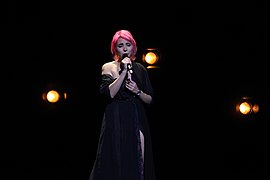 Cláudia Pascoal in Lisbon (2018)
Cláudia Pascoal in Lisbon (2018)
-
 Conan Osíris in Tel Aviv (2019)
Conan Osíris in Tel Aviv (2019)
-
 Maro in Turin (2022)
Maro in Turin (2022)
-
 Mimicat in Liverpool (2023)
Mimicat in Liverpool (2023)
-
 Iolanda in Malmö (2024)
Iolanda in Malmö (2024)
See also
- Portugal in the Junior Eurovision Song Contest – Junior version of the Eurovision Song Contest.
- Portugal in the Eurovision Dance Contest – Dance version of the Eurovision Song Contest.
- Portugal in the Eurovision Young Dancers – A competition organised by the EBU for younger dancers aged between 16 and 21.
- Portugal in the Eurovision Young Musicians – A competition organised by the EBU for musicians aged 18 years and younger.
- Portugal in the OTI Festival – A competition organised by Organización de Televisión Iberoamericana (OTI) between 1972 and 2000.
Notes
- Performance contains uncredited live vocals from Isaura
- The 2020 contest was cancelled due to the COVID-19 pandemic.
- Voted by commentators.
- All conductors are of Portuguese nationality unless otherwise noted.
References
- Fernandes, Alex (2024-04-21). "How Portugal's 1974 Eurovision entry toppled the country's fascist regime". The Observer. ISSN 0029-7712. Retrieved 2024-04-21.
- O'Connor, John Kennedy. The Eurovision Song Contest - The Official History. Carlton Books, UK. 2007 ISBN 978-1-84442-994-3
- Bakker, Sietse (29 November 2002). "EBU confirmed: Portugal resigns, Latvia is in". esctoday.com. ESCToday. Archived from the original on 4 March 2016. Retrieved 29 November 2002.
- Jiandani, Sanjay (22 November 2012). "Portugal will not participate in Eurovision 2013". esctoday.com. ESCToday. Archived from the original on 8 June 2013. Retrieved 22 November 2012.
- Jiandani, Sanjay (7 October 2015). "Portugal: RTP will not participate in Eurovision 2016". esctoday.com. ESCToday. Retrieved 7 October 2015.
- Antunes, Rui Pedro (15 May 2017). "Portugal: Preparem o MEO Arena. E 30 milhões. Vem aí a Eurovisão". Observador. Observador. Retrieved 15 May 2017.
- "Festival da Canção 2025 – 59º Festival da Canção – Regulamento" [Festival da Canção 2025 – 59th Festival da Canção – Regulations] (PDF) (in European Portuguese). RTP. 2024-08-14. Retrieved 2024-08-16.
- Floras, Stella (27 May 2008). "The 2008 Bezençon Awards winners". esctoday.com. Retrieved 8 December 2019.
- ^ "Winners of the Marcel Bezençon Awards 2017". eurovision.tv. 14 May 2017. Retrieved 8 December 2019.
- Adams, William Lee (9 July 2015). "Poll: Who was the worst dressed Barbara Dex Award winner?". Wiwibloggs. Retrieved 8 December 2019.
- van Lith, Nick (26 May 2019). "Conan Osiris wins the Barbara Dex Award 2019". escxtra.com. Retrieved 8 December 2019.
- Roxburgh, Gordon (2012). Songs for Europe: The United Kingdom at the Eurovision Song Contest. Vol. One: The 1950s and 1960s. Prestatyn: Telos Publishing. pp. 93–101. ISBN 978-1-84583-065-6.
- Roxburgh, Gordon (2014). Songs for Europe: The United Kingdom at the Eurovision Song Contest. Vol. Two: The 1970s. Prestatyn: Telos Publishing. pp. 142–168. ISBN 978-1-84583-093-9.
- Roxburgh, Gordon (2016). Songs for Europe: The United Kingdom at the Eurovision Song Contest. Vol. Three: The 1980s. Prestatyn: Telos Publishing. ISBN 978-1-84583-118-9.
- "Nuno Galopim também será comentador da Eurovisão". Portal dos Programas. 2017-04-14. Archived from the original on 2017-04-21. Retrieved 2017-05-01.
- "Filomena Cautela é a porta-voz de Portugal na Grande Final do Festival Eurovisão 2017". www.escportugal.pt. Archived from the original on 2017-05-04.
- "ESC2019: José Carlos Malato e Nuno Galopim são os comentadores da transmissão da RTP". ESCPortugal (in Portuguese). 4 May 2019. Archived from the original on 4 May 2019. Retrieved 18 November 2019.
- Diogo, João (26 April 2023). "Portugal: Nuno Galopim e José Carlos Malato comentam a Eurovisão 2023 na RTP1". ESC Portugal (in Portuguese).
- Conte, Davide (28 April 2024). "Portugal: RTP Revealed Commentators for Eurovision 2024". Eurovoix. Retrieved 28 April 2024.
- "ESC2024: Mimicat é a porta-voz do júri de Portugal na Final da Eurovisão 2024" [ESC2024: Mimicat is the spokesperson for Portugal's jury in the Eurovision 2024 Final]. ESC Portugal (in European Portuguese). 9 May 2024. Retrieved 9 May 2024.
| Portugal in the Eurovision Song Contest | |
|---|---|
| National selection: Festival da Canção | |
| Participation | |
| Artists |
|
| Songs |
|
| Note: Entries scored out signify where Portugal did not compete. Italics indicate an entry in a future contest. | |